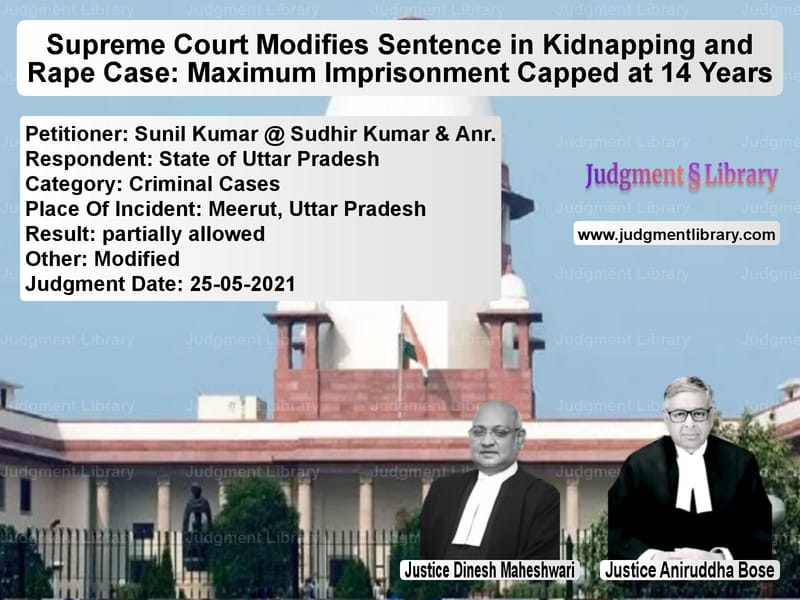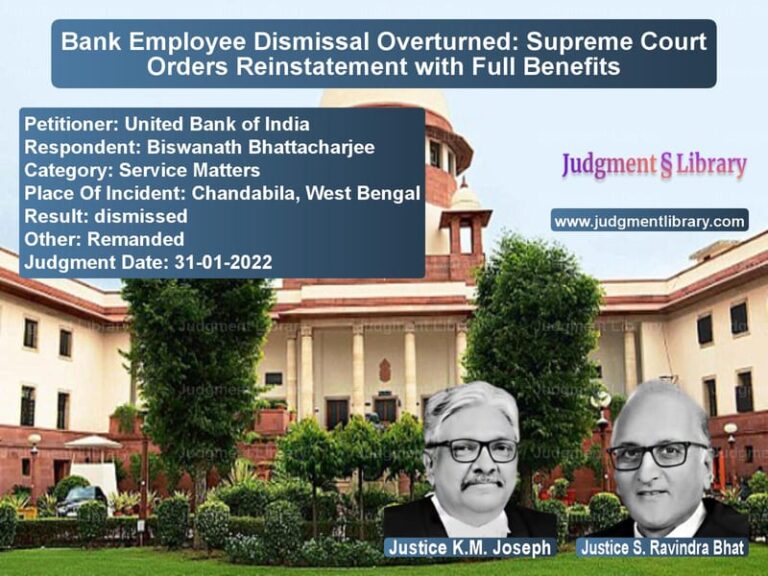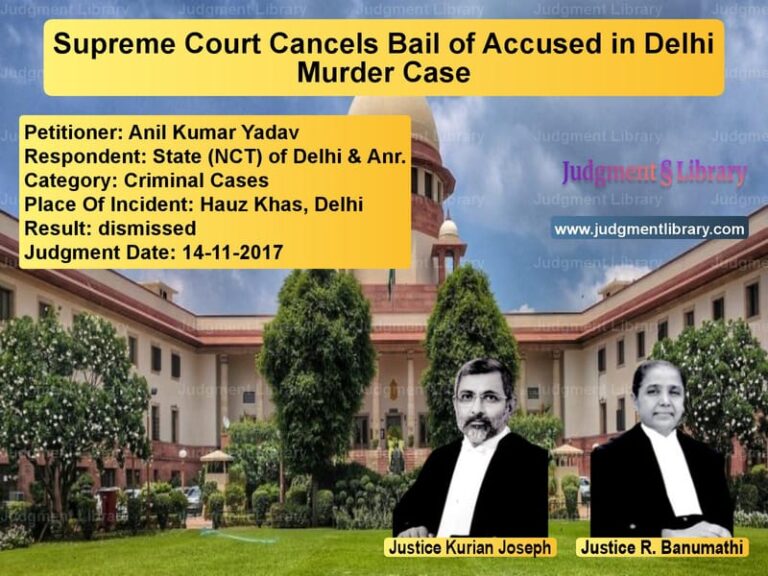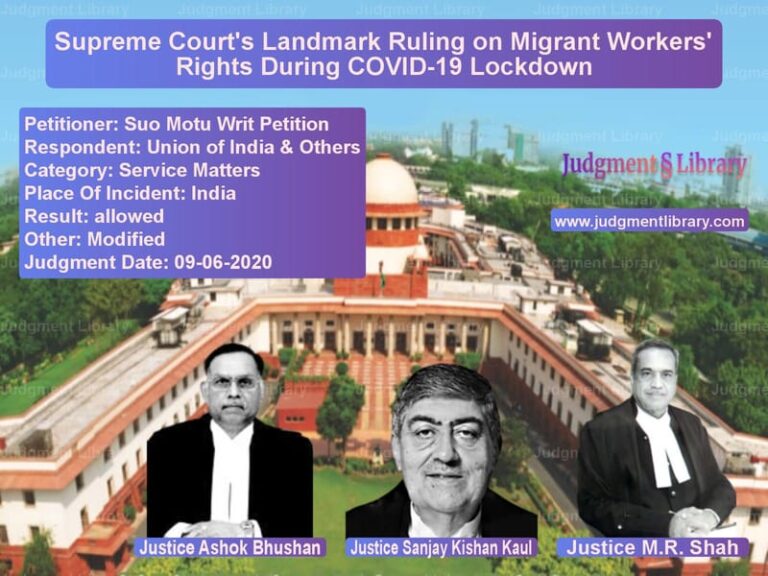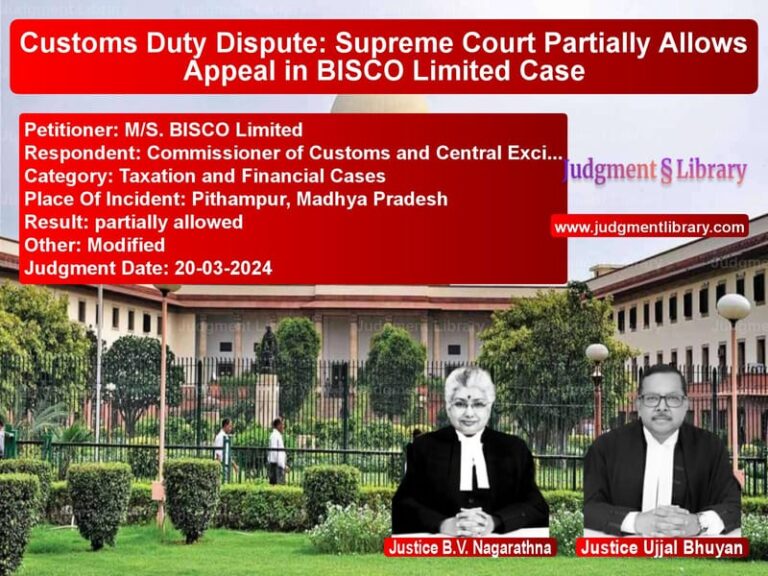Supreme Court Modifies Sentence in Kidnapping and Rape Case: Maximum Imprisonment Capped at 14 Years
The Supreme Court of India has ruled on the sentencing of two appellants convicted under Sections 363, 366, and 376(1) of the Indian Penal Code (IPC). The case, Sunil Kumar @ Sudhir Kumar & Anr. v. The State of Uttar Pradesh, involved the kidnapping and rape of a 13-year-old girl in 2008. The Court upheld their conviction but modified the sentence, capping the total imprisonment period at 14 years.
Background of the Case
The case stemmed from an incident on January 15, 2008, when a 13-year-old girl went missing in Meerut, Uttar Pradesh. The victim’s father lodged an FIR on February 3, 2008, leading to the registration of Case Crime No. 44 of 2008 under Sections 363 and 366 IPC. The investigation revealed that the victim had been enticed away by the second appellant, Faimuddin @ Feru @ Sonu, and was subsequently raped. A charge-sheet was filed against the appellants under Sections 363, 366, and 376 IPC.
Trial Court’s Verdict
The Additional District and Sessions Judge, Fast Track Court No. 5, Meerut, convicted the appellants and imposed the following sentences:
- 5 years of rigorous imprisonment and a fine of ₹2,000 for the offence under Section 363 IPC.
- 7 years of rigorous imprisonment and a fine of ₹3,000 for the offence under Section 366 IPC.
- 10 years of rigorous imprisonment and a fine of ₹5,000 for the offence under Section 376(1) IPC.
The Court, however, did not specify whether the sentences would run concurrently or consecutively.
High Court Proceedings
Only the first appellant, Sunil Kumar, appealed to the Allahabad High Court in Criminal Appeal No. 7399 of 2008, limiting his arguments to the question of sentence. The High Court upheld his conviction but modified the default imprisonment period for non-payment of fines:
- 5 months for Section 376(1) IPC.
- 3 months for Section 366 IPC.
- 1 month for Section 363 IPC.
The High Court did not address the concurrent or consecutive running of the sentences.
Appeal to the Supreme Court
The appellants approached the Supreme Court, arguing that:
- The Trial Court failed to specify whether the sentences should run concurrently or consecutively.
- The sentences should run concurrently, following the ‘single transaction’ principle.
- The appellants had already served over 13 years in jail, and requiring them to serve 22 years would be disproportionate.
Arguments by the Petitioner (Appellants)
The appellants’ counsel, Mr. Amit Pai, presented the following arguments:
- Under Section 31 of the Code of Criminal Procedure (CrPC), a court must specify whether sentences run concurrently or consecutively.
- When multiple offences arise from the same transaction, sentences should run concurrently.
- The absence of explicit direction by the Trial Court should favor the appellants.
- Several Supreme Court precedents, such as Nagaraja Rao v. CBI and O.M. Cherian v. State of Kerala, support concurrent sentencing in similar cases.
- The appellants had already served 13 years and 2 months in prison, making a further 22-year sentence unduly harsh.
Arguments by the Respondent (State of Uttar Pradesh)
The Additional Advocate General, Mr. Vinod Diwakar, defended the Trial Court’s sentencing:
- Section 31 CrPC allows courts to decide whether sentences run concurrently or consecutively.
- Given the gravity of the crime (kidnapping and rape of a minor), the Trial Court was justified in imposing consecutive sentences.
- The ‘single transaction’ principle does not automatically grant concurrent sentencing.
- The Trial Court’s silence on concurrency implied that the sentences should run consecutively.
Supreme Court’s Observations and Judgment
1. Obligation to Specify Sentence Structure
The Supreme Court reiterated that when awarding multiple sentences, trial courts must specify whether they run concurrently or consecutively:
“It is legally obligatory upon the Court of first instance while awarding multiple punishments of imprisonment to specify in clear terms as to whether the sentences would run concurrently or consecutively.”
2. Single Transaction Principle
The Court rejected the appellants’ claim that the ‘single transaction’ principle automatically mandated concurrent sentences, stating that:
“The principle related with ‘single transaction’ cannot be imported for dealing with the question at hand.”
3. Modification of Sentence
After considering the facts, the Court concluded that requiring the appellants to serve a total of 22 years would be excessive. Therefore, the Supreme Court, in exercise of its powers under Article 142 of the Constitution, ordered that:
- The maximum period of imprisonment to be served by the appellants shall be 14 years.
- The requirement to pay fines and the default stipulations remain intact.
Final Verdict
The Supreme Court allowed the appeal in part, stating:
“The maximum period of imprisonment to be served by the appellants shall be 14 years and not beyond.”
Conclusion
This ruling reinforces the necessity for trial courts to explicitly specify whether sentences run concurrently or consecutively. It also affirms that sentencing must balance retribution with proportionality, ensuring justice without excessive punishment.
Petitioner Name: Sunil Kumar @ Sudhir Kumar & Anr..Respondent Name: State of Uttar Pradesh.Judgment By: Justice Dinesh Maheshwari, Justice Aniruddha Bose.Place Of Incident: Meerut, Uttar Pradesh.Judgment Date: 25-05-2021.
Don’t miss out on the full details! Download the complete judgment in PDF format below and gain valuable insights instantly!
Download Judgment: sunil-kumar-@-sudhir-vs-state-of-uttar-prade-supreme-court-of-india-judgment-dated-25-05-2021.pdf
Directly Download Judgment: Directly download this Judgment
See all petitions in Rape Cases
See all petitions in Bail and Anticipatory Bail
See all petitions in Judgment by Dinesh Maheshwari
See all petitions in Judgment by Aniruddha Bose
See all petitions in partially allowed
See all petitions in Modified
See all petitions in supreme court of India judgments May 2021
See all petitions in 2021 judgments
See all posts in Criminal Cases Category
See all allowed petitions in Criminal Cases Category
See all Dismissed petitions in Criminal Cases Category
See all partially allowed petitions in Criminal Cases Category

